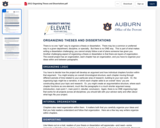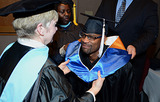
Tips to help students allocate their study time to execute effective study habits.
- Subject:
- Education
- Material Type:
- Activity/Lab
- Author:
- Tina Chung
- Date Added:
- 11/07/2020

Tips to help students allocate their study time to execute effective study habits.

A bunch of tips, that can help students overwhelm their problems in studying.

Life in academia is like life in no other profession. The intellectual freedom in conducting research coupled with the ability to positively impact the lives of students through teaching makes it exciting and noble. The road to success in making a difference through knowledge creation (research), knowledge dissemination (teaching) and activities related to both (service) is riddled with many challenges. While PhD programs are designed to teach students the nitty gritty details of conducting research, few focus on the broad issues of how to build a successful research program, how to build an effective teaching portfolio and how to do deal with the many other challenges encountered. Navigating the broader challenges of academia is often accomplished by trial-and-error or ad-hoc mentoring one may receive. Road to Success: A Guide for Doctoral Students and Junior Faculty Members in the Behavioral and Social Sciences by Viswanath Venkatesh provides advice and tools, seeks to help researchers achieve success by navigating through these very challenges.
Tell us how you are using this book If you are a graduate student or prospective graduate student, a course instructor, a scholar conducting research, or another reader please complete the form at https://bit.ly/roadtosuccess_interest
Available formats:
Paperback (ISBN:978-1-949373-73-8)
PDF (ISBN: 978-1-949373-74-5)
The book comprises 20 chapters that are organized into five major sections:
1. Research
2. Managing the PhD program
3. Life after the PhD
4. Teaching and service
5. Broader advice
In addition to the author, both junior and senior scholars have provided contributions to share their own experiences and observations of others who have been successful.
The most important components of the book are the various tools (e.g., how-to advice, checklists) that are provided to help junior researchers head up the road to success and to arm senior researchers to guide junior researchers along the way. The various tools target the following six areas:
1. Building and sustaining a research program
2. Writing a paper
3. Responding to reviews
4. Planning and monitoring through various stages of the PhD program
5. Becoming an effective teacher
6. Achieving work-life balance
About the author:
Viswanath Venkatesh is Verizon Chair of Information Technology at the Pamplin College of Business at Virginia Tech. Please visit http://www.vvenkatesh.com for more information.
Accessibility note:
Virginia Tech Publishing is committed to making its publications accessible in accordance with the Americans with Disabilities Act of 1990. The screen reader-friendly PDF utilizes header structures and includes alternative text which allows for machine-readability.

The histories of information, communication, and computing technologies have attracted attention from scholars across a variety of disciplines. This course introduces students to prominent voices in these topics across fields. Alongside readings introducing students to this broad scholarly terrain, the course offers guidance in research and writing for publication based on the reality that PhD candidates on the job market need to be published authors, and that every term paper has the potential to be a journal article. We work towards publication by reading widely-cited scholarly histories both for their content and for what they can tell us about scholarly craft.

This resource walks French learners through how to write a "dissertation dialectique", one of the staples of argumentative French essays. It includes an original example by a freshly graduated high schooler about ecology, a controversial and current issue that lands itself well to the exercise. This resource is designed for Advanced learners.

There is no one “right” way to organize a thesis or dissertation. There may be a common or preferred way in a given department, discipline, or specialty. But there is no ONE way. This is part of what makes writing a dissertation challenging; you cannot simply follow a set of plans someone has given you. Another challenging aspect of organizing a thesis or dissertation is that there are layers of organization. The overall project has an organization, each chapter has an organization, and you have to organize your ideas within and between paragraphs.

Psychology is designed to meet scope and sequence requirements for the single-semester introduction to psychology course. The book offers a comprehensive treatment of core concepts, grounded in both classic studies and current and emerging research. The text also includes coverage of the DSM-5 in examinations of psychological disorders. Psychology incorporates discussions that reflect the diversity within the discipline, as well as the diversity of cultures and communities across the globe.Senior Contributing AuthorsRose M. Spielman, Formerly of Quinnipiac UniversityContributing AuthorsKathryn Dumper, Bainbridge State CollegeWilliam Jenkins, Mercer UniversityArlene Lacombe, Saint Joseph's UniversityMarilyn Lovett, Livingstone CollegeMarion Perlmutter, University of Michigan


By the end of this section, you will be able to:Understand educational requirements for careers in academic settingsUnderstand the demands of a career in an academic settingUnderstand career options outside of academic settings

Opening image caption:Psychology is the scientific study of mind and behavior. (credit "background": modification of work by Nattachai Noogure; credit "top left": modification of work by U.S. Navy; credit "top middle-left": modification of work by Peter Shanks; credit "top middle-right": modification of work by "devinf"/Flickr; credit "top right": modification of work by Alejandra Quintero Sinisterra; credit "bottom left": modification of work by Gabriel Rocha; credit "bottom middle-left": modification of work by Caleb Roenigk; credit "bottom middle-right": modification of work by Staffan Scherz; credit "bottom right": modification of work by Czech Provincial Reconstruction Team)Psychology is designed to meet scope and sequence requirements for the single-semester introduction to psychology course. The book offers a comprehensive treatment of core concepts, grounded in both classic studies and current and emerging research. The text also includes coverage of the DSM-5 in examinations of psychological disorders. Psychology incorporates discussions that reflect the diversity within the discipline, as well as the diversity of cultures and communities across the globe.

A Personal Narrative Essay is a creative form of writing that explains a memorable event in a student's life. Like other types of essays, it follows a specific structure and includes an introduction, several paragraphs of body content, and a conclusion. The main purpose of a personal narrative essay is to convince the reader of why the applicant would be a good fit for the college or university they apply to.